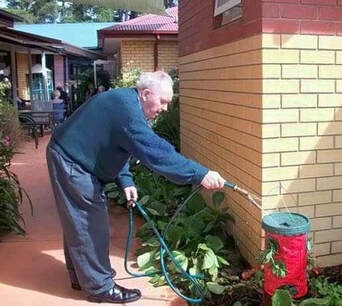 DutchCare’s Victorian homes provide a model of aged care, writes Sophie Cuttriss, in her guide to what you should look for.
DutchCare’s Victorian homes provide a model of aged care, writes Sophie Cuttriss, in her guide to what you should look for. WHEN I was teaching aged care, I took my students to visit an aged care facility operated by Dutchcare. The facility's manager was very happy for us to visit because they were proud of their facility and their staff and the wellbeing of all their residents.
My students were fascinated to see the comfortable practical rooms that felt like home, not a luxury hotel or hospital, and person-centred care based on the Eden Alternative Principles which acknowledge and address the three plagues of residential aged care: loneliness, boredom and helplessness.
The facility was more home-like than any I have seen and proved that great aged care is possible.
There are wonderful examples of building design that support home-like care in The Netherlands, Denmark and Germany – we don’t have to reinvent any wheels.
| Yet many aged care facilities in Victoria are large, institutionalised rabbit warrens that do not resemble anyone’s home. Gardens are tiny and poor quality – it drives me crazy when a facility is called “Twilight Gardens” and the garden is little more than a tiny paved courtyard. Dining rooms are sometimes huge noisy Coles cafeterias where music is played or the television is on (sometimes both), often with no regard to the preferences of the demographics of the people who live there. |  The burden of care Aug 13, 2020 - Despite the rosy ads, something has gone amiss in Australia’s aged care system. writes Sophie Cuttriss in the first part of her series. |
When people visit an aged care facility to enquire about accommodation, they are usually in a state of stress, tying to find care for a loved older person who can no longer live at home. Families may feel very guilty about this decision. Often they feel they are breaking a promise to their loved one.
Very few people approach aged care in the same way they would make other major purchases. Most leave it till the last moment, when they are faced with limited options and will accept whatever is available.
Families will often be stressed and overwhelmed and may focus on cost and urgency. They will be easily persuaded by the manager/ salesperson who gives them the guided tour.
Few people seeking residential accommodation have any previous experience or knowledge of the sector. People are often swayed by superficial designs such as a luxury foyer, chandeliers and extras such as a bar, café, cinema. I’m not saying these aren’t welcome, but beware – often all that glitters is not gold.
The following is a guideline to what you should be asking and looking for.
- What are the staff ratios? How many registered nurses per shift? Does the doctor have geriatric training? Where did the Certificate 111 staff do their training? Where does the food come from? Is there a dementia friendly garden that can be accessed by the person with dementia whenever they wish?
- Can family and friends visit any time that suits the resident’s routine? Can they share meals with them, bring in the dog, take them out for a walk/drive/visit?
- Do they practise the Eden principles as these are intended or is there merely a token gesture such as a bird in a cage?
- Can residents access other health professionals such as a dietitian, speech pathologist (crucial when there are difficulties with swallowing and eating), occupational therapist, physiotherapist, diversional therapist?
- Are there meaningful activities available for all residents including people at various stages of dementia?
- Are extra trained staff employed during late afternoon/early evening so people who are sundowning can be given purposeful activities and distractions?
- Have staff completed extra current dementia training with reputable educators?
- Can they access support and expertise from Dementia Australia and Dementia Support Australia for (formerly Dementia Behaviour Management Advisory Service)?
- What are the organisation’s philosophies regarding sexuality and intimacy needs? Yes, this always goes down like a bomb!! And the topic deserves its own article one day.
- If the facility is a secure lock up, does it have subtle security measures or does it feel like a prison?
- Do they understand and uphold advance care planning and enduring powers of attorney and guardianship?
- What care is provided when someone is at the end of their life? Are the family able to stay with their loved one who is dying? Do they have enough staff on every shift who are authorised to administer the appropriate medication for all symptom relief? Or will they die in pain and discomfort, as reported by one of my students, who watched a screaming resident and was told “We’ve done everything we can”.